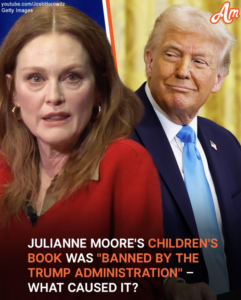Julianne Moore, the acclaimed actress and author, has expressed her profound shock and disappointment upon learning that her children’s book, Freckleface Strawberry, has been banned in schools operated by the Department of Defense Education Activity (DoDEA). This revelation has sparked widespread discussion about censorship and the role of literature in promoting self-acceptance among children.
Background of Freckleface Strawberry
Published in 2007, Freckleface Strawberry is a semi-autobiographical story that follows a seven-year-old girl who struggles with her freckles but ultimately learns to embrace them. The narrative aims to teach children the importance of self-acceptance and recognizing that everyone has unique qualities. Moore, who is the daughter of a U.S. Army veteran, wrote the book to resonate with children, especially those from military families who might face challenges related to self-image.
The Ban and Its Implications
Moore was informed of the ban by PEN America, an organization dedicated to protecting free expression. In an Instagram post, she expressed her “great shock” at the decision, highlighting that the book was intended to remind children that “we all struggle but are united by our humanity and our community.” She further emphasized her personal connection to the military community, noting her upbringing in a military family and her education in a DoDEA school. Moore lamented that children in similar circumstances would now be deprived of a book that reflects their experiences.
DoDEA’s Response
The Department of Defense Education Activity has stated that it is conducting a review of certain materials used in its schools. A spokesperson clarified that while some books have been temporarily removed for review, none have been permanently banned. The spokesperson also noted that the review is part of a broader effort to ensure that educational materials align with current policies and standards.
Public Reaction
The news of the ban has elicited strong reactions from various quarters. Critics argue that removing a book that promotes self-acceptance and diversity sends a negative message to children, especially those who may already feel marginalized. Supporters of the ban, however, have not been prominently featured in public discourse.
Conclusion
The controversy surrounding Freckleface Strawberry underscores the ongoing debates about censorship, the role of literature in education, and the values that should be imparted to children. As the review process continues, it remains to be seen how this situation will evolve and what impact it will have on the broader conversation about educational content in the United States.
